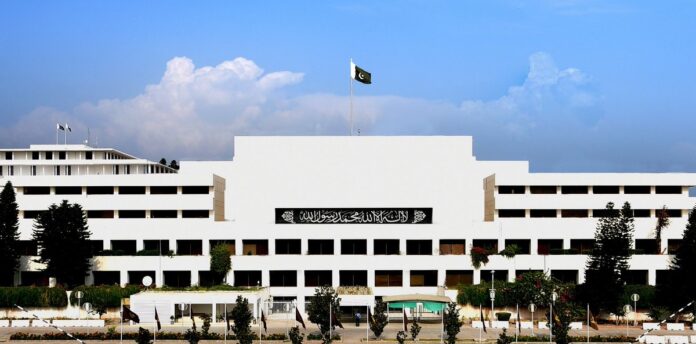Minister for Planning and Development Ahsan Iqbal on Wednesday said that Pakistan is likely to get confirmation of economic assistance from friendly countries in a few days. The assurances are one of the last few hurdles the International Monetary Fund (IMF) had asked to be cleared by Pakistan before the confirmation of a staff-level deal.
“We have fulfilled almost all conditions, which the previous government had agreed upon with the IMF and currently, the Fund is demanding confirmation from the friendly countries that are providing assistance to Pakistan. We are hopeful that the confirmation will be received in the coming few days and after that, the IMF deal will come on track,” Iqbal said, while talking to journalists after addressing the US-Pakistan Diaspora and Private Sector for Flood Recovery and Rehabilitation Conference.
The mantra of “just around the corner” has been repeated ad nauseam by the federal government over the past two months since a delegation of the IMF left Pakistan without signing a staff level agreement.
The government has been assuring the public of the signing of the agreement “within a few days” for more than 27 days now. But with no solid deadline, visibly deteriorating economic conditions and elections coming sooner than later, the government’s efforts now seem to be focused on keeping the nation calm and ensuring a vote bank with half-baked announcements such as giving ‘relief’ on petrol to low-income segments.
Once Pakistan is able to show the available financing, the IMF will convene the board meeting within days. The board meeting will approve a $1.2 billion loan tranche in addition to extending the programme tenure to June next year and increasing the total size to $7 billion. The funds are part of a bailout package the IMF had approved in 2019.
The lead up
Ahsan’s statement follows similar assurances by Prime Minister Shehbaz Sharif who is betting against an ailing economy and the ever-increasing fervour for Imran Khan to take back leadership.
On March 15, the premier had rejected recent reports in the media claiming the deal with the IMF had been delayed because of continuing political uncertainty. He went on to say that Pakistan had accepted the ‘harshest’ of demands set by the IMF and that the deal was 2-3 days away.
On March 16, Dar told the country’s upper house of parliament that several countries had made commitments to support Pakistan during previous International Monetary Fund (IMF) reviews, adding that the IMF was now asking for those commitments.
“At the time of the previous reviews, several friendly countries had made commitments to bilaterally support Pakistan, what IMF is now asking (is) that they should actually complete and materialize those commitments,” he said, adding: “That’s the only delay.”
However, on March 20, the Middle East Eye had reported that Saudi Arabia’s decision to refuse to provide any further bailouts or interest-free loans to Pakistan has left the government in Islamabad in shock. With the IMF already demanding that Pakistan provide written assurances from lender countries to achieve a staff level accord, hopes of a deal seem bleak. Donors and lenders have demanded structural reforms before giving more funds to Pakistan.
Pakistan’s creditors are knocking at the door for repayments and short-term inflation has climbed over 45%. As things stand, Pakistan will need $5 billion external financing to close its financing gap this fiscal year, which ends in June, to avoid default.
The government has been trying to receive loans from friendly countries to try and shore up forex reserves and avoid default. Pakistan has previously received a $700m loan from China to help in this regard.
A series of bad calls
On August 4, with Miftah Ismail still in charge, the State Bank of Pakistan (SBP) Acting Governor Dr. Murtaza Syed had announced that Pakistan was set to get assurances of $4 billion additional financing from friendly countries this week that will pave the way for the revival of the IMF programme.
“The discussions are taking place on various options to secure assurances for $4 billion financing and we hope that it will be done this week”, he had said adding that Pakistan was also in discussions with China for additional financing.
It was also reported that the UAE was more interested in potentially acquiring some assets, and Saudi Arabia is ready to give loans as well as oil on deferred payments.
Although the finance minister did not name the countries who made commitments to Pakistan, Saudi Arabia, the United Arab Emirates, Qatar and China have helped the country in recent months by rolling over debts and giving dollar deposits and oil on credit.
Come September 2022, however, with Ishaq Dar now in the hot seat, the situation was still in limbo.
Dar, who during a television interview said “he knew how to deal with the IMF” since he had been doing it for decades, decided to artificially keep the price of the rupee high. However, this strategy failed within a few months and by January 2023 Pakistan was staring down the possibility of default. The country began facing a shortage of forex reserves that has led to a curb of imports and skyrocketing inflation.
On January 31, an IMF delegation visiting Islamabad was unable to agree with Pakistani officials on how much money the country needs to avoid defaulting on external payment obligations. They left without a deal on February 9.
The IMF wants Pakistan to get the assurance for up to $7 billion to fund this fiscal year’s balance of payments gap. Dar, however, is of the opinion that it should be around $5 billion.
While avoiding answers with regard to debt accumulated in current government tenure owing to currency depreciation, the finance minister has so far ruled out imposing financial emergency in the ongoing situation.




